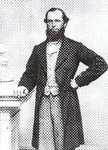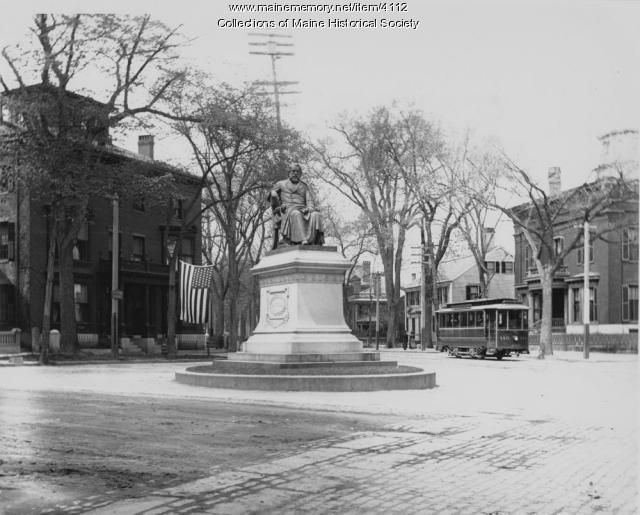Keywords: Socials
Item 27976
Farmington Social Library, Regulations, ca. 1900
Contributed by: Farmington Public Library Date: circa 1900 Location: Farmington Media: Ink on paper
Item 31517
Records of The Second Social Library in North Yarmouth, 1817
Contributed by: Prince Memorial Library Date: 1817-01-13 Location: Cumberland; North Yarmouth Media: Handwritten in ink on rag paper
Item 65229
73-75 Newbury Street, Portland, 1924
Owner in 1924: David Finkelman Use: Apartments
Item 151748
McGeachey Hall Mental Health Center, Portland, 1981
Contributed by: Maine Historical Society Date: 1981 Location: Portland Client: Maine Medical Center Architect: Stevens Architects
Item 151760
Opportunity Farm fire escapes, New Gloucester, 1944
Contributed by: Maine Historical Society Date: 1944 Location: New Gloucester Client: Opportunity Farm Association Architect: Megquier & Jones Co.
Exhibit
Throughout the history of the state, residents have protested, on paper or in the streets, to increase rights for various groups, to effect social change, to prevent social change, or to let their feelings be known about important issues.
Exhibit
Fashion for the People: Maine's Graphic Tees
From their humble beginnings as undergarments to today's fashion runways, t-shirts have evolved into universally worn wardrobe staples. Original graphic t-shirts, graphic t-shirt quilts, and photographs trace the 102-year history of the garment, demonstrating how, through the act of wearing graphic tees, people own a part of history relating to politics, social justice, economics, and commemorative events in Maine.
Site Page
Farmington: Franklin County's Shiretown - Farmington Social Library, Regulations, ca. 1900
"Farmington Social Library, Regulations, ca. 1900 Contributed by Farmington Public Library Description A bookplate lists the regulations…"
Site Page
Presque Isle: The Star City - Phair House, the Bellstead and the Social Security Building
"Phair House, the Bellstead and the Social Security Building X Text by Sebastian and Scott, students at Presque Isle Middle School Images from…"
Story
What did I do during the Covid quarantine?
by Nasser Rohani from Baha'i Community
Individuals response to Covid and social distancing.
Story
We Gonna Be Alright and Say It Loud
by Ryan Adams
Creating artwork during a period of social and cultural awakening
Lesson Plan
Longfellow Studies: Longfellow Meets German Radical Poet Ferdinand Freiligrath
Grade Level: 9-12
Content Area: English Language Arts, Social Studies
During Longfellow's 1842 travels in Germany he made the acquaintance of the politically radical Ferdinand Freiligrath, one of the influential voices calling for social revolution in his country. It is suggested that this association with Freiligrath along with his return visit with Charles Dickens influenced Longfellow's slavery poems. This essay traces Longfellow's interest in the German poet, Freiligrath's development as a radical poetic voice, and Longfellow's subsequent visit with Charles Dickens. Samples of verse and prose are provided to illustrate each writer's social conscience.
Lesson Plan
Longfellow Studies: An American Studies Approach to Henry Wadsworth Longfellow
Grade Level: 6-8, 9-12
Content Area: English Language Arts, Social Studies
Henry Wadsworth Longfellow was truly a man of his time and of his nation; this native of Portland, Maine and graduate of Bowdoin College in Brunswick, Maine became an American icon. Lines from his poems intersperse our daily speech and the characters of his long narrative poems have become part of American myth. Longfellow's fame was international; scholars, politicians, heads-of-state and everyday people read and memorized his poems. Our goal is to show that just as Longfellow reacted to and participated in his times, so his poetry participated in shaping and defining American culture and literature.
The following unit plan introduces and demonstrates an American Studies approach to the life and work of Longfellow. Because the collaborative work that forms the basis for this unit was partially responsible for leading the two of us to complete the American & New England Studies Masters program at University of Southern Maine, we returned there for a working definition of "American Studies approach" as it applies to the grade level classroom. Joe Conforti, who was director at the time we both went through the program, offered some useful clarifying comments and explanation. He reminded us that such a focus provides a holistic approach to the life and work of an author. It sets a work of literature in a broad cultural and historical context as well as in the context of the poet's life. The aim of an American Studies approach is to "broaden the context of a work to illuminate the American past" (Conforti) for your students.
We have found this approach to have multiple benefits at the classroom and research level. It brings the poems and the poet alive for students and connects with other curricular work, especially social studies. When linked with a Maine history unit, it helps to place Portland and Maine in an historical and cultural context. It also provides an inviting atmosphere for the in-depth study of the mechanics of Longfellow's poetry.
What follows is a set of lesson plans that form a unit of study. The biographical "anchor" that we have used for this unit is an out-of-print biography An American Bard: The story of Henry Wadsworth Longfellow, by Ruth Langland Holberg, Thomas Y. Crowell & Company, c1963. Permission has been requested to make this work available as a downloadable file off this web page, but in the meantime, used copies are readily and cheaply available from various vendors. The poem we have chosen to demonstrate our approach is "Paul Revere's Ride." The worksheets were developed by Judy Donahue, the explanatory essays researched and written by the two of us, and our sources are cited below. We have also included a list of helpful links. When possible we have included helpful material in text format, or have supplied site links. Our complete unit includes other Longfellow poems with the same approach, but in the interest of time and space, they are not included. Please feel free to contact us with questions and comments.



















